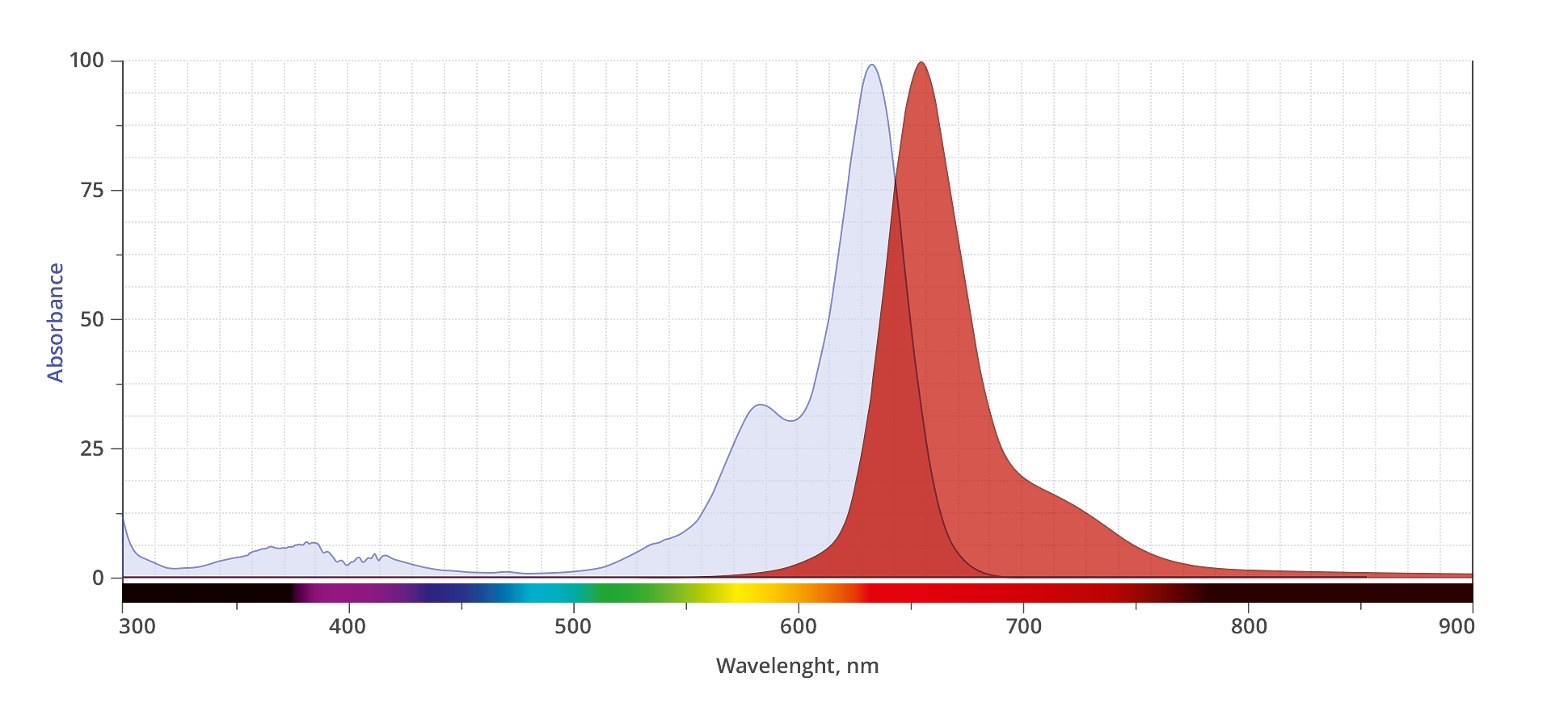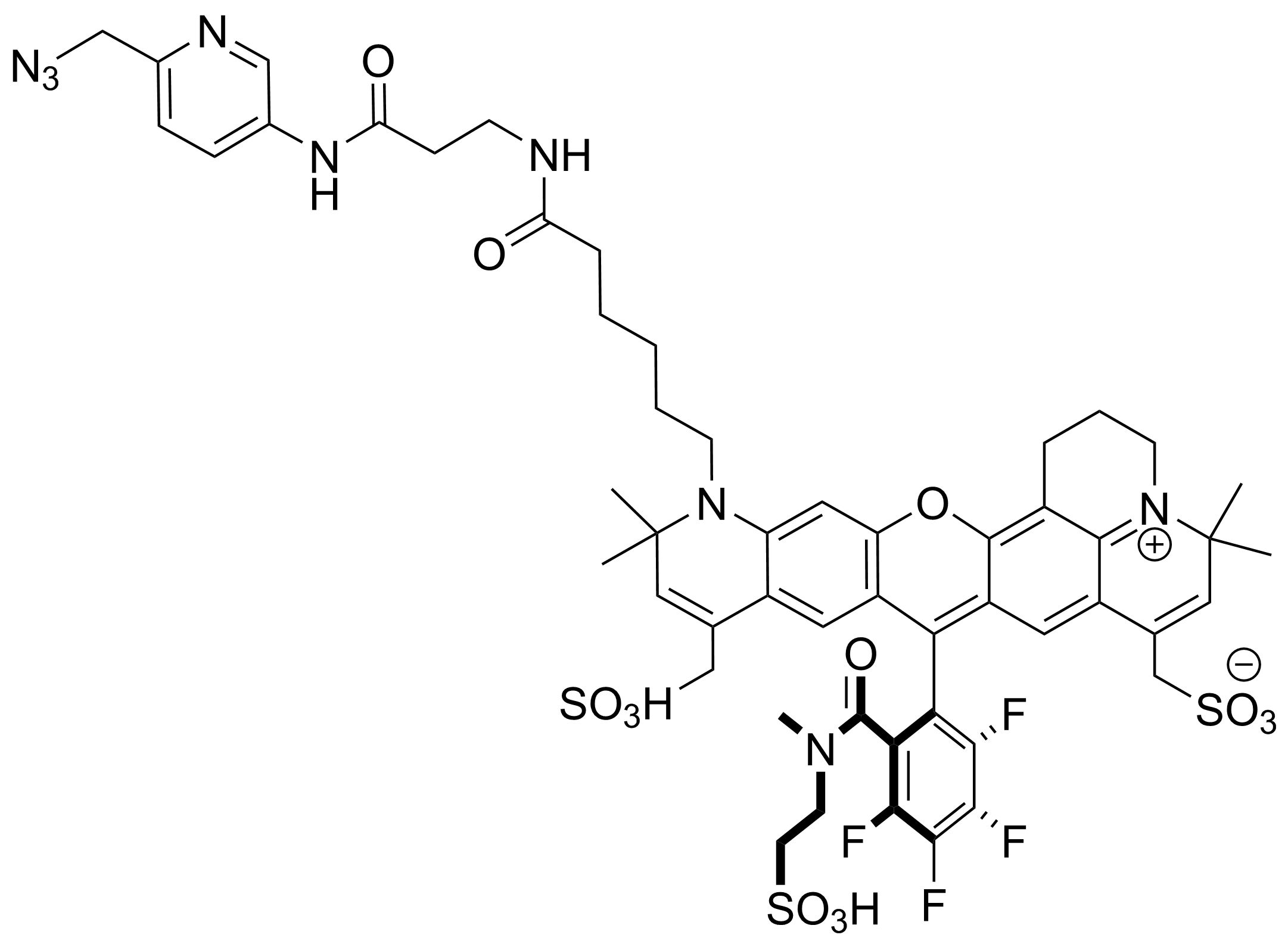AFDye 633 Picolyl Azide
Abs/Em Maxima: 631/651 nm
Extinction Coefficient: 100,000
Flow Cytometry Laser Line: 633 nm or 647 nm
Microscopy Laser Line: 633 nm or 647 nm
Spectrally Similar Dyes: Alexa Fluor? 633, CF? 633

AZDye? 633 Picolyl Azide is an advanced fluorescent probe that incorporates a copper-chelating motif to raise the effective concentration of Cu(I) at the reaction site to boost the efficiency of the CuAAC reaction, resulting in a faster and more biocompatible CuAAC labeling. Up to 40-fold increase of signal intensity, compared to conventional azides, was reported (see Selected References).
AZDye? 633 Azide is a bright and photostable far-red fluorescent probe with excitation ideally suited to the 633 nm or 635 nm laser excitation source. AZDye? 633 Azide is water-soluble, pH-insensitive from pH 4 to pH 10. AZDye? 633 spectrally is almost identical to Alexa Fluor? 633, DyLight? 633 or CF? 633 Dye. Combination of superior brightness and very low autofluorescence background signal in most biological samples in far-red spectral region allows for very sensitive detection of alkyne-labeled biomolecules.

1. Morral, C., et al. (2020). Protocol for Efficient Protein Synthesis Detection by Click Chemistry in Colorectal Cancer Patient-Derived Organoids Grown In Vitro. STAR Protocols, Volume 1, 2 [ScienceDirect]
2. Uchiyama, J., et al. (2020). Quantitative nascent proteome profiling by dual pulse labeling with O-propargyl-puromycin and stable isotope labeled amino acids. The Journal of Biochemistry, 10, 1093. [Oxford Academic]
3. Jiang, H., et al. (2014). Monitoring Dynamic Glycosylation in Vivo Using Supersensitive Click Chemistry. Bioconjugate Chem.,, 25, 698-706. [PubMed]
4. Uttamapinant, C., et al. (2012). Fast, Cell-Compatible Click Chemistry with Copper-Chelating Azides for Biomolecular Labeling. Angew. Chem. Int. Ed,., 51, 5852-56. [PubMed]
5. Gaebler, A.,et al. (2016). A highly sensitive protocol for microscopy of alkyne lipids and fluorescently tagged or immunostained proteins. J. Lipid. Res., 57, 1934-47. [PubMed]
Abs/Em Maxima: 346/445 nmExtinction Coefficient: 19,000Spectrally Similar Dyes: Alexa Fluor? 350, CF? 350, DyLight 350, AMCAAZDye? 350 is a blue-fluorescent azide-activated probe that reacts with terminal alkynes via a copper-catalyzed click react…
Abs/Em Maxima: 402/424 nmExtinction Coefficient: 35,000Flow Cytometry Laser Line: 405 nmMicroscopy Laser Line: 405 nmSpectrally Similar Dyes: Alexa Fluor? 405, CF? 405, Cascade Blue?, DyLight? 405AZDye? 405 Azide is a water-soluble, pH-insensiti…
Abs/Em Maxima: 346/445 nmExtinction Coefficient: 19,000Spectrally Similar Dyes: Alexa Fluor? 350, CF? 350, DyLight 350, AMCAAZDye? 350 Alkyne (Alexa Fluor? 350 Alkyne equivalent) is a blue-fluorescent, alkyne-activated probe that reacts with azid…
Abs/Em Maxima: 430/537 nmExtinction Coefficient: 15,000Spectrally Similar Dyes: Alexa Fluor? 430, CF? 430AZDye? 430 Azide is a water-soluble, green-fluorescent azide-activated probe that reacts with terminal alkynes via a copper-catalyzed click re…
Abs/Em Maxima: 346/445 nmExtinction Coefficient: 19,000Spectrally Similar Dyes: Alexa Fluor? 350, CF? 350, DyLight 350, AMCAAZDye? 350 DBCO reacts with azides via a copper-free “click chemistry” reaction to form a stable triazole and does not re…
Abs/Em Maxima: 402/424 nmExtinction Coefficient: 35,000Flow Cytometry Laser Line: 405 nmMicroscopy Laser Line: 405 nmSpectrally Similar Dyes: Alexa Fluor? 405, CF? 405, Cascade Blue?, DyLight? 405AZDye? 405 Alkyne reacts with azides via a copper…
Abs/Em Maxima: 494/517 nmExtinction Coefficient: 73.000Flow Cytometry Laser Line: 488 nmMicroscopy Laser Line: 488 nmSpectrally Similar Dyes: Fluorescein, Alexa Fluor? 488, CF? 488A, DyLight? 488, Atto? 488AZDye? 488 Azide (Alexa Fluor? 488 Azi…
Abs/Em Maxima: 402/424 nmExtinction Coefficient: 35,000Flow Cytometry Laser Line: 405 nmMicroscopy Laser Line: 405 nmSpectrally Similar Dyes: Alexa Fluor? 405, CF? 405, Cascade Blue?, DyLight? 405ZDye? 405 DBCO reacts with azides via a copper-fr…
